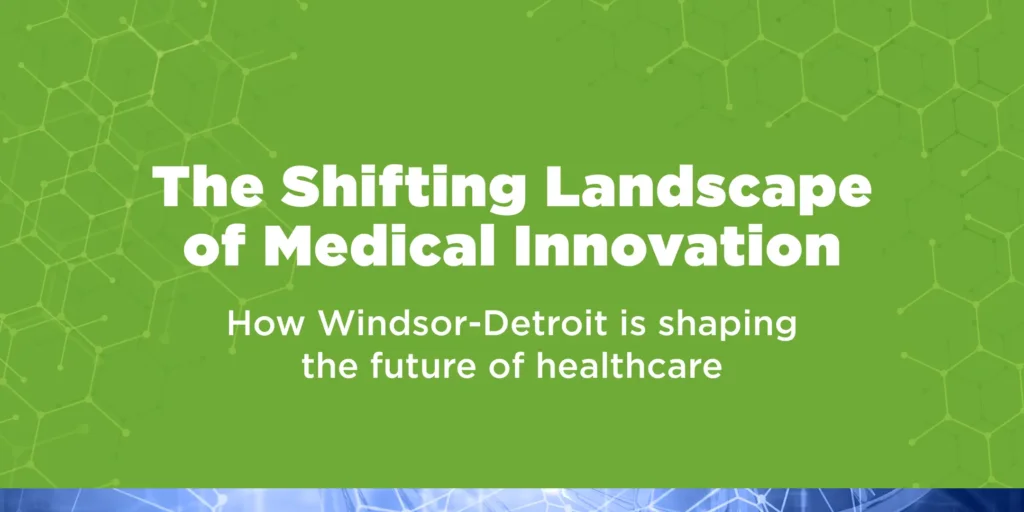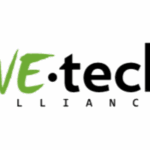Home » The Shifting Landscape of Medical Innovation
The Shifting Landscape of Medical Innovation

The unique cross-border relationship between Windsor and Detroit has long been touted as a catalyst for innovation across various industries, including healthcare.
In the rapidly evolving landscape of modern medicine, our region stands as the nexus between the US and Canada; a beacon of potential where innovators are pioneering solutions to address the escalating complexities of a diverse population.
As traditional care models struggle to keep pace, local researchers are poised to tackle these shifting dynamics, ushering in new ways to help people live longer, healthier lives.
By fostering connections, WEtechAlliance strives to be a conduit for these exciting transformations, working with organizations and individuals on both sides of the border to drive progress through collaboration.
“Canada’s innovation landscape offers a fertile ground for rapid market impact,” says WEtech’s Director of Venture Services & Partnerships Adam Castle. “While integrating innovation into the publicly funded healthcare system presents hurdles, the US presents a larger and more receptive market. As a result, many healthcare innovators in Canada leverage the US as a testing ground, refining their technologies there before introducing them back into the Canadian market. Moreover, the movement within the Canadian innovation ecosystem is gaining momentum, facilitated by initiatives such as The Coordinated Accessible National (CAN) Health Network. CAN Health provides Canadian health innovation companies with an integrated and receptive marketplace by removing the most common access barriers that prevent businesses from growing and scaling to their full potential.”
“…we’ve got an incredible network of folks across that border waiting for Canadian innovations to commercialize.”
Because of our unique geographical location, adds Castle, WEtech can act as a convener of Canadian innovators who want to explore that market but don’t know how.
“We can work with our RIC (Regional Innovation Centre) partners, all 17 of them, right across the network, to say we’ve got this great gateway and we’ve got an incredible network of folks across that border waiting for Canadian innovations to commercialize,” he shares.
Last month’s MedHealth Summit in Detroit is the latest culmination of these efforts, says Castle.
Since 2017, the MedHealth Summit has transformed the way healthcare innovation is discovered, sourced, and delivered in Michigan and Ontario. The summit is a welcoming, barrier-free environment where meaningful connections can be made within the healthcare ecosystem.
“The concept driving MedHealth, with WEtechAlliance as a founding member, stemmed from the success of Hacking Health Windsor-Detroit. It aims to deepen connections among our healthcare systems, professionals, and innovators to revolutionize healthcare,” explains Castle. “With over 3000 healthcare workers crossing the border daily, along with patients, we recognize the immense opportunities present in this landscape. And so, we look at that and ask, ‘What geographical opportunities does this unique cross-border dynamic present?’”
At this year’s summit, WEtech had the chance to not only emcee the event, but also to collaborate with organizers, adds Castle.
“What we saw was this incredible appetite that throughout the year, there’s going to be more interaction, more connection to investors for Canadian companies that are looking to innovate, and more opportunities for folks on this side of the border in the tech space to leverage research and to leverage the networks that they’ve created through world class universities and healthcare systems like MSU and Henry Ford.”
The Medhealth Summit was host to a full Canadian contingency of innovators who spoke about what the future of healthcare looks like for both countries, including several WEtechAlliance clients: BeAware, Hera Fertility, Advanced High Tech Centre, and Audacia Bioscience.
WEtechAlliance currently has nearly two dozen medhealth focused companies in their portfolio, one of the top three industries they support.
One such med-tech company, Complex Therapeutix, is working on the future of drug delivery systems and recently won the RBC Founders Program pitch competition, hosted by EPICentre.
“What if instead of having to take your psychotropic meds once every day, you take it once a month and it would be just as effective, without having to worry about forgetting a dose? Or what if your cancer treatment was halved in terms of the frequency, but how long it lasted in your system was just as effective?” says Castle. “These innovators at the University of Windsor are working on that exact problem.”
Castle also points to entrepreneurs who are creating various applications and AI solutions to bridge the accessibility gap.
“There is now so much more accessibility using things like connected devices, AI, and IoT. So, all of the buzzwords that we’ve been hearing for 20 plus years are becoming your front line of healthcare in the home. And that’s where a lot of this work is going to be done.”
Home-based solutions and meeting people where they’re at are quickly emerging as the top trends in healthcare as we look to the future, notes Castle. It’s a sentiment shared by renowned health futurist, Dr. Zayna Kayat, who recently spoke to a group of local healthcare professionals and entrepreneurs on closing the equity gap, as well as health technologies and how they’re transforming the ways we detect, prevent, and treat illness.
“Medicine will advance more in the next 10 years than it did in the last 100 years,” she shares. “Consumer devices in our homes will know more about us than a clinic.”

Health futurist Dr. Zayna Kayat (left) speaks with WEtech’s Adam Castle during a fireside chat at the recent The Future of Health event.
The conversation highlighted the significance of data collection and analytics, as well as the importance of the human connection.
“Zayna has worked all over the world solving the biggest problems in healthcare and her take primarily was that, where we’re at now is the distance between the phonograph to the television to where we’re going with all of the new technologies that are on the horizon in the next ten years,” says Castle. “You talk about AI and how that’s such a transformative force across every industry. And in healthcare, what it means is better data on patients, better interaction between primary care and the patients that they’re working with. But it also means localizing healthcare and bringing it closer to where people are.”
What we’ve learned is that the hospital is a reactive tool, he adds.
“In healthcare, it’s where you go when something is wrong. But in order to actually provide health outcomes and wellness to a population that’s going to be living so much longer than they ever have before, you want to focus in on how do you prevent? Part of that is enabling people to be more health conscious and health focused. And part of that is giving them the tools so that they can effectively communicate what’s going on with their bodies, even when they don’t know.”
Castle hopes to continue these types of conversations in the coming year, hosting dynamic speakers from the medtech space and connecting thought leaders on both sides of the border to ensure our area remains on the forefront of the healthcare revolution.
“We’re going to continue building and continue creating those relationships, not just for companies in Windsor and Essex County, but for companies right across the regional innovation center network in Ontario.”

Jennifer Brignall-Strong is WEtechAlliance’s Manager of Events & Community. Her media career spans over 15 years, with experience in marketing, events, promotions, copywriting, and radio production. Jen’s work has been featured in multiple local publications, including The DRIVE Magazine and Windsor Body. As an active member of the community, Jen also volunteers her time as a member of the Board of Directors for the Sexual Assault Crisis Centre. She is also a regular contributor to AM800 CKLW and Tourism Windsor-Essex and runs Tailgate Takeout; a local food blog showcasing the best places to eat and explore in YQG. Through her work, she hopes to showcase the region as an amazing place to work, play, and live.
WEtechAlliance
https://www.WEtech-alliance.com/
WEtech Alliance has served as a catalyst for technology and innovation in the Windsor-Essex and Chatham-Kent, Ontario regions since 2011. We’re a non-profit organization that provides entrepreneurs and companies with business services, training, I.P. and commercialization support, mentorship and strategic connections to help bring new ideas to market, scale to the next level and build a dynamic culture and a community of innovation.


